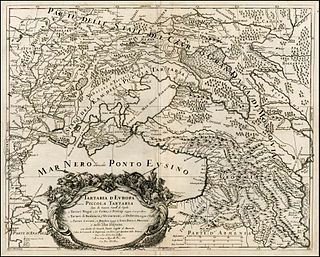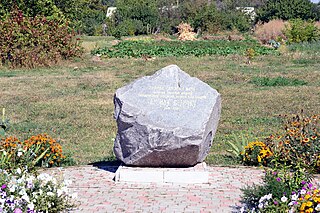This article relies largely or entirely on a single source .(May 2022) |
The chronology of Ukrainian language suppression presents a list of administrative actions aimed at limiting the influence and importance of the Ukrainian language in Ukraine.
This article relies largely or entirely on a single source .(May 2022) |
The chronology of Ukrainian language suppression presents a list of administrative actions aimed at limiting the influence and importance of the Ukrainian language in Ukraine.
Before the Russian annexation, there were several writing languages in Ukraine. Religious texts were dominated by the Ukrainian variant of Church Slavonic (the so-called Meletian, after the reforms Meletius Smotrytsky). [1] The language of administration since the 16th and 17th centuries (for western Ukraine this process began as early as the 15th century [2] ) was Polish, as well as Latin. [3] The significant degree of Polonization of the Ukrainian elites led to the fact that Polish was also used in other areas, and in the 17th century it became the main language of religious polemics. [3] Ukrainians who did not undergo language polonization used Church Slavonic in high-ranking texts (liturgical, theological, dramatic texts, poetry), and Ruthenian in lower-ranking texts (tales, private documents), also known as prosta mova (lit. 'simple speech'). [4] The latter initially developed in the Belarusian territories and had many features of the spoken Belarusian language, but over time it took over the features of the local language in the Ukrainian territories, and also borrowed much from Church Slavonic and Polish. [5] The language shaped in this way became the language of administration in the Cossack Hetmanate, it also began to be used as the language of literature, became standardized and moved away from the spoken language. [6]
At the end of the 18th century Ivan Kotliarevsky (1769-1838) initiated the process of formation of the modern literary Ukrainian language, based on south-eastern dialects and prosta mova. [7] Due to restrictions imposed by the Russian government, the development of the Ukrainian language moved to western Ukraine, which led to changes in the language, called "Galicianisms." [8]
The systematic suppression of the Ukrainian language by the Russian Empire began with the conquest of a large part of Ukraine by Russia (Left-bank Ukraine) in 1654-1667, and also after the liquidation of the Cossack Hetmanate and the Zaporozhian Sich in 1764 and 1775. The unsuccessful rebellion of Cossack Hetman Ivan Mazepa (1708-1709), who attempted to throw off Russian supremacy, can be taken as the starting moment. [9] Unlike Ukraine under Russian rule, there were no administrative obstacles to the development of the Ukrainian literary language in Western Ukraine, which was part of the Austrian Empire. However, due to its inferior status (the official language was first German, then Polish, the Ukrainian community lacked a Ukrainian-speaking intelligentsia) its development was hampered. [10]
In 1765-1786, the administrative language of the Hetmanate was gradually Russified, it let to the complete adoption of Russian as the language of administration of Ukrainian lands in place of the Ruthenian language (prosta mova) ad the end of the period. [15] [17] As a result Ruthenian language is limited to the private use and to works not designed for printing. [14]

Ukrainian is an East Slavic language of the Indo-European language family, spoken primarily in Ukraine. It is the native language of Ukrainians.
Ruthenian is an exonymic linguonym for a closely related group of East Slavic linguistic varieties, particularly those spoken from the 15th to 18th centuries in the Grand Duchy of Lithuania and in East Slavic regions of the Polish–Lithuanian Commonwealth. Regional distribution of those varieties, both in their literary and vernacular forms, corresponded approximately to the territories of the modern states of Belarus and Ukraine. By the end of the 18th century, they gradually diverged into regional variants, which subsequently developed into the modern Belarusian, Ukrainian, and Rusyn languages.

The Directorate, or Directory was a provisional collegiate revolutionary state committee of the Ukrainian People's Republic, initially formed on November 13–14, 1918 during a session of the Ukrainian National Union in rebellion against Skoropadsky's regime. During the overthrow of Pavlo Skoropadsky it was named as the Executive Council of the State Affairs. Its authority was extended by the Labor Congress of Ukraine on January 23–28, 1919.

The name Ukraine was first used in reference to a part of the territory of Kievan Rus' in the 12th century. The name has been used in a variety of ways since the 12th century, referring to a certain territory within the boundaries of Kievan Rus. There is a version that for the first time the border territory between the Kyiv and Pereyaslavl principalities of Rus' was called Ukraine. The use of "the Ukraine" is officially deprecated by the Ukrainian government and many English language media publications.
The Ukrainian orthography is orthography for the Ukrainian language, a system of generally accepted rules that determine the ways of transmitting speech in writing.
George Yurii Shevelov also known by his numerous literary pseudonyms Yurii Sherekh, Hryhory Shevchuk, Šerech, Sherekh, Sher; Гр. Ш., Hr. Sh., Ю. Ш., Yu. Sh., etc. was a Ukrainian-American professor, linguist, philologist, essayist, literary historian, and literary critic of German heritage. A longtime professor of Slavic philology at Columbia University, he challenged the prevailing notion of a unified East Slavic language from which Ukrainian, Belarusian and Russian later developed, instead proposing that these languages emerged independently from one another.
Borys Mykolayovych Hudyma is a Ukrainian diplomat and politician, who has served as Ukraine's ambassador to the European Union and as Permanent Representative of Ukraine to the United Nations.

Samiilo Vasyliovych Velychko — was a Ukrainian Cossack nobleman and chronicler who wrote the first systematic presentation of the history of the Cossack Hetmanate.
Yaryzhka or Orthography of Slobozhanshchyna is the name of the Russian pre-revolutionary orthography used to write and print works in the Ukrainian language in the Russian Empire. Yaryzhka included all the letters that were part of the Russian Cyrillic alphabet of the pre-revolutionary period: ы, ъ, and so on.

The COVID-19 pandemic was confirmed to have reached the Donetsk People's Republic (DPR), a disputed Russian republic in eastern Ukraine, in March 2020.
The History of Ukrainian literature includes laws of the historical and literary process, literary genres, trends, works of individual writers, features of their style, and the importance of artistic heritage in the development of Ukrainian literature.
The Alphabet War, also called the Alphabet Blizzard, was a controversy in the 19th century among Galician Ukrainians. It concerned attempts to Latinize the Ukrainian alphabet.
Hrinchenkivka or hrinchevychivka was Ukrainian orthography introduced by Borys Hrinchenko's Ukrainian-Russian dictionary in 1907.

Zhelekhivka was Ukrainian phonetic orthography in Western Ukraine from 1886 to 1922, created by Yevhen Zhelekhivskyi on the basis of the Civil Script and phonetic spelling common in the Ukrainian language at that time for his own "Little Russian-German Dictionary", which was published in full in 1886.
Shashkevychivka, Spelling of the Mermaid of the Dniester, and also Spelling of the Ruthenian Triad is the first phonetic spelling system for the Ukrainian language based on the adapted Cyrillic script, used by the Ruthenian Triad in the almanac "Mermaid of the Dniester" (1837). Markiian Shashkevych used to be considered the author of the spelling system used in "Mermaid of the Dniester", which is why it is called Orthography of Shashkevych or Shashkevychivka. The use of the phonetic principle of spelling was motivated in the foreword by Markiian Shashkevych by the fact that «we need to know what the true face is in the present language; because of this we follow the rule: „write as you hear, and read as you see“».
The Ukrainian orthography of 1933 is the Ukrainian orthography, adopted in 1933 in the capital of the UkrSSR, Kharkiv. It began the process of artificial convergence of Ukrainian and Russian language traditions of orthography. Some norms that were rejected due to their absence in the Russian orthography were returned to the Ukrainian orthography of 2019.
The Day of Ukrainian Literature and Language is a holiday of the development of the State Language, which is celebrated every year in Ukraine on October 27.
Klymivka is a village in Poltava Raion of Poltava Oblast of Ukraine. It belongs to Lanna urban hromada, one of the hromadas of Ukraine. Their local government body is called the Klymivka Village Council.
Derussification in Ukraine is a process of removing Russian influence from the post-Soviet country of Ukraine. Derussification started after the collapse of the Soviet Union in 1991 and intensified with the demolition of monuments to Lenin during Euromaidan in 2014 and the further systemic process of decommunization in Ukraine. The Russo-Ukrainian War gave a strong impetus to the process. The process manifests itself in the renaming of toponyms named after Russian statesmen and cultural figures, or those that are believed to reflect Russianism and the Russian worldview, or are otherwise associated with Russia. Also part of the process is the dismantling of objects of the Russian rule. As of April 8, 2022, according to a poll by the sociological group Rating, 76% of Ukrainians support the initiative to rename streets and other objects whose names are associated with Russia. In March 2023, the Ukrainian parliament passed a law that forbade all toponymy with names associated with Russia.
Bavovna is a Ukrainian phrase and internet meme that gained prominence during the Russian invasion of Ukraine, humorously used to refer to explosions, both those in Russian-occupied Ukraine and those in Russia itself.